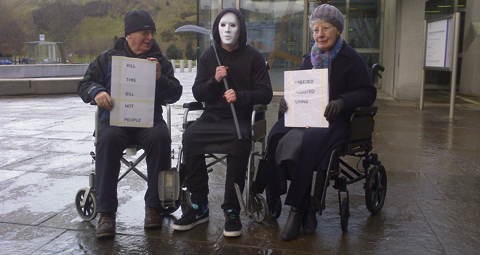BY Ian Dunn | January 16 2015 | ![]() 0 COMMENTS
0 COMMENTS ![]() print
print

Demonstration outside Holyrood on assisted suicide as bill progresses
Publication Date: 2015-01-16
The latest attempt to legalise assisted suicide in Scotland has run into difficulties as lawyers suggested it could be unworkable, while protesters made their opposition clear outside the Scottish Parliament.
The Assisted Suicide (Scotland) Bill would give people with a progressive degenerative condition or terminal illness the right to seek the help of a doctor to help end their lives. It is firmly opposed by the Catholic Church. On Tuesday, the bill made progress on its passage through the Scottish Parliament as the health committee began taking evidence on the proposed legislation.
As that happened, opponents of assisted suicide led by the disabled rights group Not Dead Yet UK gathered outside the Scottish Parliament to protest.
“The bill would put many vulnerable people at risk as no safeguard can protect against all the influences that could pressure someone into making the decision to end their life,” a spokesperson for the group said. “The push for assisted suicide comes from a genuine concern for suffering but at the cost of unjust risks to the vulnerable and with no clear boundaries. The truly compassionate response is help and good care.”
Inside the parliament, legal experts and the police said the proposed law needed more clarity.
Professor Alison Britton of the Law Society of Scotland said a definition of assisting suicide was needed, especially in cases where someone had become too ill to end their life. “We need to be very clear what actually this assistance encompasses, and we need to be also clear at what point is there a demarcation where assistance is being given and that actually crosses over to being complicit in homicide,” she said.
Prosecutor Stephen McGowan, representing the Crown Office, and Detective Chief Superintendent Gary Flannigan, of Police Scotland, also voiced concern over legalising assisted suicide.
Aidan Michael Cook, of Care Not Killing Scotland, added that ‘legalising an action normalises it so that it often becomes expected.’
—Read the full version of this story in Jan 16 print edition of the SCO.











